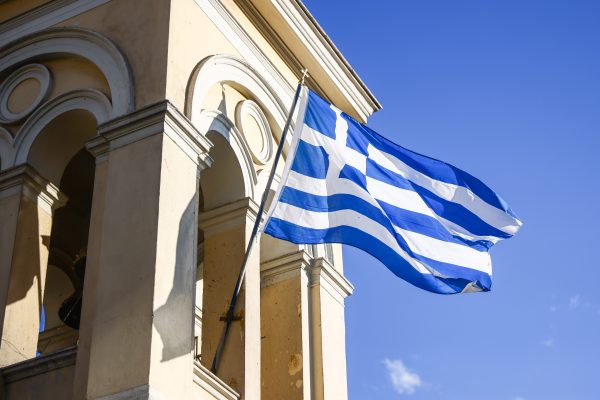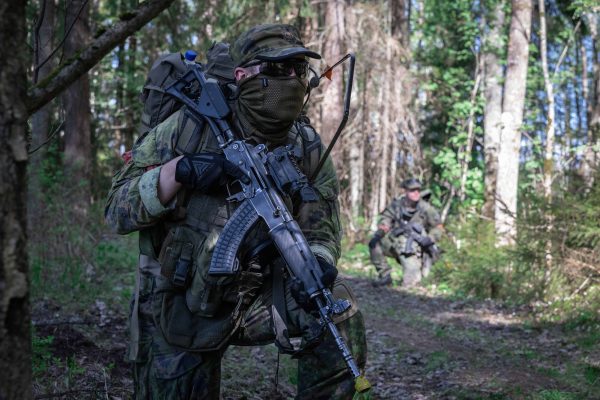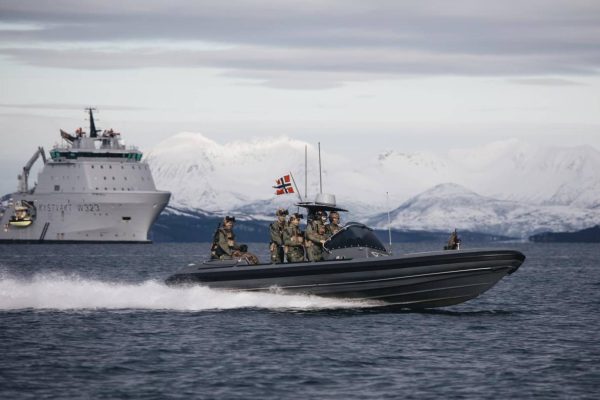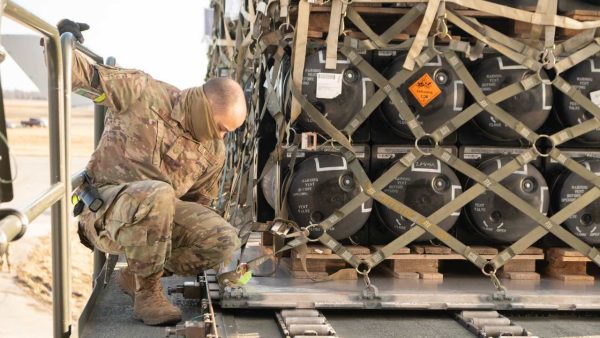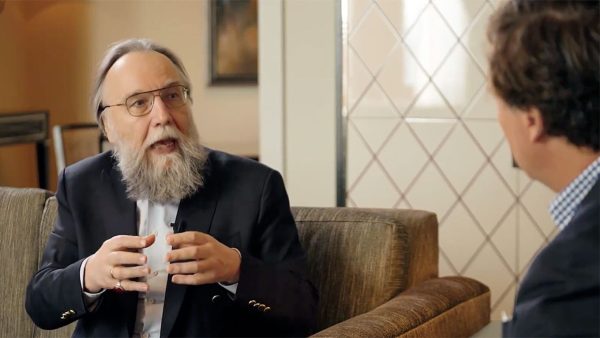Alina Polyakova
Hello, I’m Alina Polyakova. I’m the president and CEO of the Center for European Policy Analysis. And welcome to this discussion as part of CEPA’s series on the state of the Alliance, one year after Russia’s full scale invasion of Ukraine. I’m absolutely delighted to be joined for this conversation by the British ambassador to the United States. Dame Karen Pierce. Madam Ambassador, thank you so much.
Karen Pierce
Thank you very much Alina.
Alina Polyakova
So let me just start off with a broad question. We are one year into this unfortunate war. Massive human costs, financial costs, obviously, security military costs, how do you assess where the alliance is today? From where we were a year ago in terms of supporting Ukraine?
Karen Pierce
I think the support for Ukraine has as long been there, even in the run up to the invasion, there was a lot of support for Ukraine. But I think it’s remarkable the way the alliance has not just held together, but has come to do more and more together, from equipment provision from training, from sanctions, to supporting Ukraine’s economy and supporting the humanitarian effort. And as you saw at Munich now talking about Ukraine’s future, and where does it fit into Europe? And what sort of security assurances might be needed to support that? But if I were Russia, I’d reflect on the fact that the invasion has only made Ukraine stronger. And it’s only made the Alliance more determined to help Ukraine.
Alina Polyakova
So let me ask a follow up then, because the United Kingdom, I think, had one of the more most robust responses to Russia’s invasion of Ukraine. Certainly in the early days of the war, I think we saw incredibly powerful leadership coming from London at the time that as some of my American friends would say, privately, put us to shame in the United States and really forced Washington to act much more assertively. Where does London stand now? We’ve obviously had some shifts in the prime minister’s office for the last year. What is what is the policy as you assess it today is the policy for Ukraine to win?
Karen Pierce
Oh, yes, is for Ukraine to win to be able to push the Russians back, and preferably out of their territory. But that’s for Ukraine to decide the point at which Ukraine decides it wants to enter into negotiations is a very important part of Ukraine’s sovereignty in all of this, but you’re right about British support. Very unusually, we had three prime ministers over last summer. But each one of them has been absolutely steadfast in our support for President Zelenskyy, the Ukrainian people, and Ukraine’s sovereignty, and as Rishi Sunak made clear in Munich, that’s a position we’re going to take continue to take.
Alina Polyakova
And do you hear other allies speaking with the same voice, that you’ve heard from current prime minister and previous prime ministers that the goal of Western policy should be for Ukraine to win? How do you assess the broader conversations in the alliance? And yes, there have been, obviously some public debates about specific weapon system tanks. What was the most recent one? Now the alliance is discussing potential fighter jets? And there’s obviously debate on that. Where do you think this, this is heading? Do you see these debates influencing the policy? Because we don’t always have agreement, do we, on specific systems in particular?
Karen Pierce
I think it’s fair to say there’s often a lot of debate and discussion around specifics. But there’s no debate. There’s there’s steadfast agreement on the overall aims. But that’s always the way with NATO. It works by consensus. As you know, it’s right that all members should have a perspective on what’s been discussed, whether that’s equipment, or training or the way ahead. But I think when it all comes together, and you can see in the public statements of Stoltenberg, the public statements for the EU of von der Leyen, the things that ministers say in the G7 and at NATO and that you heard at Munich, there’s a really steadfast dream there to continue supporting Ukraine, as long as it takes. What we all want to see is a decisive shift. That’s why we’ve brought forward training. That’s why the tanks have been provided. But it’s worth pointing out that all of this is still reactive. Russia is doing all these terrible things. to Ukraine. It is Russia, who is escalating, and the equipment that allies and others provide Ukraine is in response to that escalation from Russia and also so that we can help Ukraine make a difference on the ground faster.
Alina Polyakova
Let me follow up on that, on your point that so far the alliance has been reactive, because the Russians are pushing forward, the escalating the war. The Alliance is helping Ukraine defend itself and its territorial integrity. That is rightfully Ukraine’s. You know, I think one of the bigger questions is how do we shift from a reactive policy to a more proactive policy? One of the conversations what’s happening today is how should the Alliance be thinking about Ukraine’s long term security? Obviously, NATO is on the table, and I think should remain on the table for Ukraine. But what is your sense of how the conversation on security fits into the discussions we’re having and Ukraine’s reconstruction? I know the UK will be hosting the next conference on Ukraine’s reconstruction and rebuilding, is security going to be part of that? How do you think about these two threats in the long term security and the long term resilience of Ukraine?
Karen Pierce
I think it’s a very important part of European security and stability as a whole. Ukraine is by territory, the second largest country in Europe, you could say that Russia is the first, so a heavily capable Ukraine is an important part of European security and stability, not just for Ukrainians. But it says something about Europe’s collective willingness to defend itself against future Russian aggression. There’s also the point that if we get to a peace agreement, and that’s for Ukraine to be in the lead on, but were we to get to a peace agreement, you would want Ukraine to be able to have the means to defend itself and defend that peace agreement. I think that’s a very important part, Russia should also think about the future, Ukraine will want to fit into European security. As far as economics go, I think there is quite a task there. Because the EU and NATO and the UK, were already helping Ukraine with economic reform before the Russians invaded. Now we’ve got to help them put the economy back together. It’s still obviously a war economy. But there are some underlying issues there, that it would be good to address if we can as we go along. So that’s the sort of thing, the reconstruction conference we’ll look at. It’s all about restoring Ukraine’s sovereignty, giving her a place right at the heart of Europe, where she can protect herself and contribute to European stability.
Alina Polyakova
You know, one of the issues that also has been coming up on the economic side, there was a study that was released a few weeks ago that showed that 90% of Western companies have not divested their business from Russia, which I think was quite shocking to see that number. What do you think, is in the power of the British government, other governments to do to try to encourage the private sector to get on board? And I think, see the bigger picture that you’re describing that things aren’t going to go back to business as usual with Russia after this, which seems to be that a lot of private sector companies are counting on that. What can governments really do, though, to make to send the message to the private sector to make sure that it’s not just our sanctions that are not being evaded in some way by some of these companies, but that Russian citizens also feel the effects of the war in increasingly most significant ways when they can’t access some certain western goods in their own country?
Karen Pierce
Oh, I think Russian citizens already do feel the effects of the war quite sharply. To be honest, you know, President Putin set out to reestablish the Russian Empire, and all he’s succeeded in doing is recreating the Soviet economy of 30 years ago. So I think for ordinary Russians, the effects are being felt. I think the reaction from the private sector, some very big firms after the invasion when the first wave of sanctions came through from the G7, and others, that was very important, and as I say, is returned the Russian economy to the state with a parlous state, it was in 30 years ago, governments will go on explaining to the private sector and we will carry on looking together at what further sanctions might be necessary.
Alina Polyakova
And in terms of the the future of Russia, still that theme a little bit since you mentioned that. There was some recent news recently coming out of President Putin’s address that Russia was going to suspend its participation, the New START Soviet era treaty between the United States and the Soviet Union that has now continued for many, many years and many analysts say that this is the end of arms control and nuclear arms control or together because obviously, we’ve had the failure of other treaties in the past the the INF and the EVM. Before that, is this a serious breaking point? You think in the broader nuclear arms control treaties that are governing nuclear arms across the world? Or is the environment so different now than it was during the Cold War era where so many other countries have access to nuclear weapons that perhaps these agreements are less relevant? How do you assess that threat that we have just recently heard, based on Russia’s decision to suspend new start?
Karen Pierce
Well, I think the word threat is is an opposite one. This is President Putin trying to up the ante and put pressure on the west and try and sow divisions in NATO, because there will be some countries who were more worried about this move, stepping back, I think it’s a very important move, whether it’s decisive or not, I think we have to wait to see. But Russia has broken so many European agreements with its invasion of Ukraine in the first place. In some ways, if they’re looking around for other things to do, they obviously look in the nuclear direction. Now, that’s concerning. But as I say, it may not be decisive. And we have stood up to President Putin saber rattling in the past.
Alina Polyakova
So maybe just one final question on the big picture here. You know, we have an alliance that is very much united in its support for Ukraine, the UK has been a leading voice in making the case for supporting Ukraine. Of course, the United States has been a big part of that. And I think the UK-US relationship has, has gotten far, far stronger than already was before Russia’s invasions of invasion of Ukraine. But now, of course, we have this other element that here’s the big picture, which is China. And China, I think has sent some worrying signals recently, in terms of its potential support for Russia. And yeah, how do you assess where we’re heading? You know, with the kind of rhetoric we’ve been hearing most recently from Chinese officials, will — What do you think will happen? Will China step into this war off the sidelines where they have been? And then how will we respond as an alliance? Do you think this will be an inflection point for the war? If China doesn’t take that decision to supply Russia with weapons? How do we, as an alliance start to prepare for that potential contingency?
Karen Pierce
When I think Secretary Blinken took the first step in what he was saying at the weekend, Munich, he then had a conversation with Wang Yi, the British Foreign Secretary also has had this conversation with one year and will go on having those conversations about the importance of not supplying arms to Russia, of the importance of coming back and helping us support Ukraine’s sovereignty. Fundamentally, the Chinese believe very deeply in sovereignty and territorial integrity, which is why I think at the same time, as you have these rumors about supplying arms, you also have these hints that the Chinese may want to put forward a peace process where they’re going to have trouble doing that, unless they tackle the question of sovereignty. So So let’s see. But we certainly continue to encourage the Chinese to help us restore Ukraine’s sovereignty, and we urge them not to supply weapons to Russia.
Alina Polyakova
Well, Madam Ambassador, this was a very spanning conversation for just a short 15 minutes, we covered everything from weapons assistance to Ukraine, to the state of the Alliance to the future of Russia and China. So thank you so much for this really interesting discussion. And thank you for the UK’s continued leadership and his support for Ukraine. Thank you.
Karen Pierce
It’s our duty and we’re proud to do it. Thank you.
Alina Polyakova
Thanks so much.


